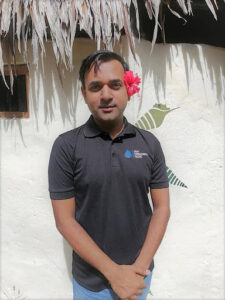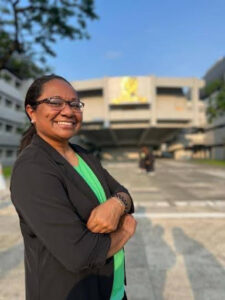Keynote Speakers
Krishneer Sen

Biography
Krishneer Sen is born Deaf and a native Fiji Sign Language user living in Suva, Fiji in the Pacific region. He has advanced the human rights of deaf people and persons with disability for over 10 years by participating politically, professionally and socially in the Deaf Community and disability sector. His extensive contribution to the Deaf and interpreter Community began initially at the local level, then more broadly nationally in Fiji and the South Pacific and for the past 10 years, he has been actively involved in the international realm.
Krishneer currently works as a Senior Deaf Education Advisor for the Pacific region for Tetra Tech. He is the Deaf Interpreter representative for the World Association of Sign Language Interpreters (WASLI) Oceania region, and Chair of the World Federation of the Deaf Regional Secretariat for Oceania (WFDRSO).
Krishneer holds a Masters degree in Linguistics from the Chinese University of Hong Kong in Hong Kong. He also holds a Masters degree in Human Rights from University College London in the United Kingdom, a Bachelor of Science degree from Gallaudet University in Washington D.C, U.S.A, and a Certificate in Information Technology from UNITEC in Auckland, New Zealand.
Krishneer actively promotes recognition of the Deaf Community by providing awareness to stakeholders on the importance of linguistics and Deaf culture, interpreting, education etc. He contributes extensively to the Deaf Community and disability sector in the Pacific in regards to youth, sign language, sports, interpreting and education.

Biography
Inise Tawaketini is the current Regional Representative for the Oceania region of the World Association of Sign Language Interpreters (WASLI).
“I have been a sign language Interpreter in Fiji for more than a decade now but have never received any formal training except for a 10 weeks course in 2006 and professional development and training by visiting interpreters over the years. I learned Sign Language from a Deaf friend Tuliana Waibuta whom I met in Nauru in 1998 and because of her influence I first became a teacher of the Deaf at the Gospel School of the Deaf before becoming a Sign Language Interpreter. It is also where I developed my love for language and my desire to understand the grammar of sign language. Thanks to the support of the WASLI board and (then Vice-President) Susan Emerson, I got to attend the 2019 WASLI conference in Paris. It was at this conference that I was encouraged to apply for a Sign Linguistics Masters degree in Hong Kong in 2021, which I have now completed. I am thankful to my Lord and Savior for His amazing plan in the career I have today. For the people He has brought to my life to support my development as an Interpreter and to provide me opportunities. It is this support that I seek to extend to others. Just as I received opportunities, I would like for Interpreters in the region to have the same opportunities so we can grow in our knowledge and skills and better serve the community that we have been called to serve, the Deaf community.”
Abstract
In the Oceania Neighbourhood
When we know who our neighbours are, it enables us to connect in meaningful ways. Sharing our knowledge, skills and experiences will lead to growth, acceptance and respect of our rich diverse communities.
In this keynote address, Krishneer and Inise will describe how they work together to lead developments in the Pacific region in their roles as WASLI and WFD representatives for Oceania.
They will give an overview of developments in the Pacific region, focusing on the achievements and challenges of Deaf and interpreting communities in this ‘neighbourhood’. They will compare the situation for interpreters and Deaf communities in New Zealand, Australia, and the Pacific Islands by drawing on a situational analysis report that was completed in recent years, as well as on their own experiences as interpreters and community members in Fiji.
Krishneer will also describe the work of Deaf interpreters in Fiji and how WASLI supports Deaf interpreters worldwide.
This keynote address will explore existing relationships in the Pacific at regional, national and international levels and will identify opportunities for strengthening collaboration in the area, including a planned WFD/WASLI Oceania conference in Fiji in 2025.

